Ata-ul-Haye Nasir, Al Hakam
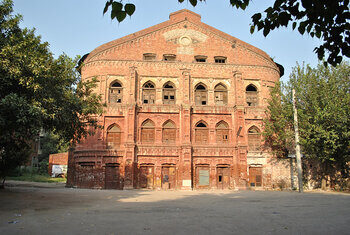
On 14 November 1923, Hazrat Mirza Bashiruddin Mahmud Ahmad, al-Musleh-e-Maudra delivered a public speech at the Bradlaugh Hall in Lahore, where a huge number of Hindus and Muslims were in attendance. The session was chaired by Sir Sheikh Abdul Qadir Sahib, barrister-at-law, whose name for the presidency was proposed by Hazrat Sir Chaudhry Muhammad Zafrulla Khan Sahibra and seconded by Babu Abdul Hameed Sahib.
In his introductory remarks, the president of the session said:
“Respected audience, first of all, I wish to thank you all for allowing me to preside over such a great gathering, which a very distinguished religious leader is going to address. You might know that respected Mirza Bashiruddin Mahmud Ahmad Sahib, whose presence here is an immense fortune for the people of Lahore, is going to speak on a crucial matter. He is the religious leader of a large Muslim community and has devoted his whole life to religious goals. […]” (Al Fazl, 20 November 1923, p. 7)
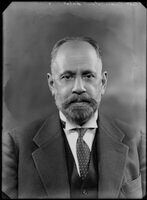
At the beginning of his lecture, Hazrat Musleh-e-Maudra said the turmoils and disorders prevalent in British India were enough to urge everyone who claimed to love their homeland to contemplate finding solutions to those problems.
Huzoorra continued:
“I belong to that religion which has instilled a passion of hope by commencing [its teachings] with:
اَلْحَمْدُ لِلّٰهِ رَبِّ الْعٰلَمِيْنَ
“‘All praise belongs to Allah, Lord of all the worlds.’ (Surah al-Fatihah, Ch.1: V.2)
“And religiously, I believe in that [Holy] Book, which has granted us everlasting hope by teaching the Muslims that:
وَاٰخِرُ دَعۡوٰهُمۡ اَنِ الۡحَمۡدُ لِلّٰهِ رَبِّ الۡعٰلَمِيۡنَ
“And the conclusion of their prayer shall be, ‘All praise be to Allah, the Lord of the worlds.’ (Surah Yunus, Ch.10: V.11)
“Therefore, though the current circumstances are very bleak, my heart is filled with hope and I firmly believe that if not today, in the future, peace will surely be established in the country. If not now, then at some other point in time, the people will incline towards peace and harmony, and leave aside the disorder, violence, enmity, and division. […]
“Currently, the circumstances of our country are such that [political] parties are not ready to show compassion towards each other. In the past, there was a sense of mutual love within the country; Muslims, Hindus and Sikhs had the spirit of brotherhood among them. But today, these communities are expressing their opposition and enmity towards each other, which has halted the country’s progress.
“Some people blame us [Ahmadis] for being the cause of the disorder, and that we hinder the way of unity and agreement. However, the reality is that no one is more against this disorder than we are. […] Anything that creates disorder, we consider to be wrong and we are ever ready to offer all kinds of sacrifices and to bear all sorts of afflictions for anything that we deem beneficial for our country and homeland. […]
“Currently, the country’s peace is completely shattered; brothers are clashing with brothers, and those who were supposed to be exerting efforts with unity for the progress of the country and homeland, are blood-thirsty towards each other. […]
“Islam teaches:
حُبُّ الْوَطَنِ مِنَ الْاِيْمَانِ
“Meaning that ‘Love for one’s country is part of faith.’ [Mauzu‘at-e-Kabir, by Mulla Ali Qari, p. 35, published from Delhi in 1315 Hijri]
“In the presence of such a beautiful teaching, there is no need to invent any other policy because when the Foundersa of Islam has taught that ‘Love for one’s country is part of faith’, then no Muslim can be a [true] Muslim until they inculcate the love of the country in their heart.” (Paigham-e-Sulh: Maujuda Mushkilat Ka Hal, Anwar-ul-Ulum, Vol. 7, pp. 295-304)
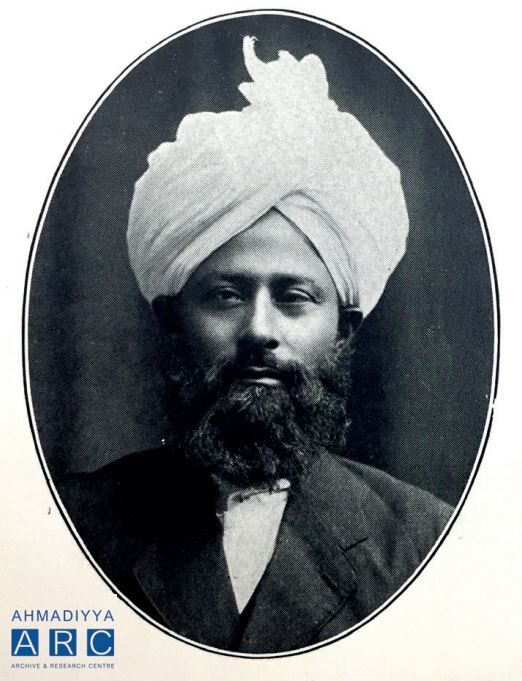
Huzoorra went on to narrate the reasons behind the disputes and disagreements between different communities of British India.
After this, Huzoorra outlined a pathway for the Muslims of British India, which was necessary for their strength and prosperity. Huzoorra said:
“The first thing that can help in conciliation is that the Muslims should strengthen themselves [as a community]. […] In comparison to the Hindus, the Muslims are in more need of strengthening themselves. […] The Holy Quran commands the Muslims:
يٰۤاَيُّهَا الَّذِيۡنَ اٰمَنُوۡا خُذُوۡا حِذۡرَكُمۡ فَانۡفِرُوۡا ثُبَاتٍ اَوِ انۡفِرُوۡا جَمِيۡعًا
“‘O ye who believe! take your precautions; then either go forth in separate parties or go forth all together.’ (Surah an-Nisa, Ch.4: V.72) […]
“Therefore, the Muslims must strengthen themselves and for this, they need to be organised. […] Secondly, Muslims need to make themselves socially independent. […] The Muslims have given all of the sources of their national life to others. […] If the Muslims wish to prosper, they would need to stand on their own feet and make themselves independent from others. […]
“In addition, the Muslims need to pay attention to trade and industry and they should also join the fields of medicine and law in greater numbers. The Muslims are far behind in banking; thus, they should make progress in this regard. Although I am against the dealing of interest because Islam does not permit it, I believe that a bank can still function without interest, provided the nation is prepared. Moreover, Muslims should pay attention towards trading since currently the export and import of India are wholly in the hands of Hindus. […]
“Thirdly, the Muslims need to instil unity and mutual harmony by removing their internal political and religious disagreements. […]
“Fourthly, religious spirit should be inculcated amongst the Muslims. I am seeing that Muslims are moving away from their religion and expressing their love for religion only on the political spectrum. The Muslims must not only instil religious passion within themselves but also in their children as well.
“Fifthly, the preaching of Islam needs more attention. […] Therefore, I will advise the Muslims that, if they wish to progress, they are required to spread their religion. Moreover, they should not get angry at the Hindus that they are propagating their religion; rather [the Muslims] need to propagate their own religion and convert people to Islam. The Holy Quran has declared tabligh of the religion as a Muslim’s duty. Therefore, it is stated:
كُنۡتُمۡ خَيۡرَ اُمَّةٍ اُخۡرِجَتۡ لِلنَّاسِ تَاۡمُرُوۡنَ بِالۡمَعۡرُوۡفِ وَتَنۡهَوۡنَ عَنِ الۡمُنۡكَرِ
“‘You are the best people raised for the good of mankind; you enjoin what is good and forbid evil.’ (Surah al-e-Imran, Ch.3: V.111)
“The superiority and excellence of the Muslims [can be proved] by bringing the followers of other religions towards Islam.
“Sixthly, the poor people should be cared for. This is a social necessity because until there is affection and a certain bond amongst the people of a nation, it cannot progress. However, I am afraid to say that there are certain wealthy people among Muslims who care for their own lives but not for the poor. There should be such organisations and societies that teach professions to poor people and then create work opportunities for them.
“Seventhly, special arrangements should be made for those people in the nation who cannot work, for instance, the disabled. Similarly, the orphaned children should be provided with education and tarbiyat [moral training].” (Paigham-e-Sulh: Maujuda Mushkilat Ka Hal, Anwar-ul-Ulum, Vol. 7, pp. 313-317)
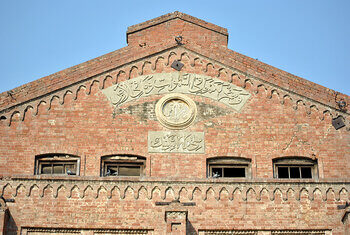
Huzoorra then invited all groups and communities in India to work towards establishing peace and harmony in the country:
“Peace cannot be established until all of the parties reconcile with each other. […] I include the government in these parties as well. Now, the British government is part and parcel of our country and it would be wrong to hope for conciliation to be maintained by leaving aside [the government]. […] I am not of those who say that whatever the government does is right, but rather I say that sometimes the government makes mistakes as well.
“On such occasions, I had drawn the government’s attention using firm language, which was necessary (firm language does not mean abusing, since Islam forbids it, rather it means to explain to the government their mistake in clear and frank terms). […] And I have noticed that on most occasions the government has accepted those suggestions. […]
“Peace cannot be established in the country until there is religious conciliation. The followers of a certain religion cannot enter into a settlement which harms their religion. Religious conciliation does not mean that all Muslims become Hindus or all Hindus become Muslims, rather, it means that the followers of all religions respect the leaders of each other’s religion. […]
“If one asks how the conciliation could be established, then I will say that Islam has taught its pathway, and I am among the followers of this pathway taught by Islam. I respect the founder and leader of every religion. If a Hindu asks, ‘Do you believe in Ramchandar?’ I will respond that I believe him to be a prophet because the Holy Quran states:
وَاِنۡ مِّنۡ اُمَّةٍ اِلَّا خَلَا فِيۡهَا نَذِيۡرٌ
“‘And there is no people to whom a Warner has not been sent.’ (Surah Fatir, Ch. 35: V. 25)
“Therefore, [supposedly] if I say that [God forbid] Ramchandar Ji and Krishan Ji were false [claimants], it will falsify the Holy Quran. Thus, the Holy Quran has given its decree about this dispute that every Muslim stands for respecting the leaders of other religions, not disrespecting them. This is the point of view of the Muslims. Now, I ask the Hindus (it does not mean to say that they are bound to respond, but rather contemplate and think in their hearts) whether they are ready for this and if yes, then such a strong conciliation can be established that will be everlasting. […]
“However, if they are not ready for this, then at least the Muslims and Hindus should narrate the distinctive features of their respective religions. […] Therefore, if the Hindus do not accept the Holy Prophetsa as a truthful prophet of God, they should at least agree to narrate the distinctive features of their religion and avoid raising allegations against Islam. If they agree to this, it will be enough to create unity.
“The founder of our Community, Hazrat Mirza [Ghulam Ahmad] Sahibas had presented this solution a while ago, but sadly, the country did not pay attention to it. The result was that unity could not be established, and it certainly cannot be established until [the above-mentioned solution] is acted upon. […]
“The followers of a certain religion should not be deprived from [acting upon] their religious fundamentals. […] Hence, we Muslims are ready to not deprive the Hindus of anything that is part of their faith, and similarly, the Hindus are required to not deprive us of anything that is lawful for us. […] Thus, it is necessary to accept the rights of every community. […]
“In the end, while reminding you of the responsibilities which are incumbent upon you concerning the country’s love, morals, soul and humanity, I appeal to you to ponder on these proposals. May Allah the Almighty enable us all to follow those pathways that could establish peace and harmony.” (Paigham-e-Sulh: Maujuda Mushkilat Ka Hal, Anwar-ul-Ulum, Vol. 7, pp. 318-325)
After Huzoor’s lecture, the president of the session delivered his concluding remarks and said:
“I express my gratitude to the respected Mirza Sahib for delivering such a comprehensive and insightful speech. He stated that ‘I spend my whole time in religious study’, however, he has shed light on the political situation so extensively that our hearts and tongues are compelled to appreciate it. You all would have noticed that respected Mirza Sahib has pointed out all aspects of unity and harmony in such a nice and profound manner that cannot be expected from political leaders. In fact, they [political leaders] are unable to do so, since they have an affiliation with a certain party, however, respected Mirza Sahib has no affiliation with any party, and thus, he has stated all aspects in great detail without any hesitation.” (Al Fazl, 20 November 1923, p. 9)
The Civil and Military Gazette published a detailed report of this lecture, and wrote:
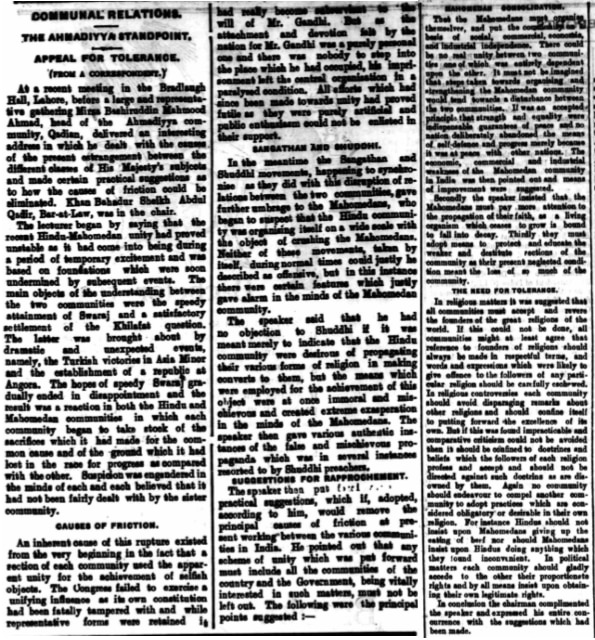
“Communal Relations
“The Ahmadiyya Standpoint
“Appeal for Tolerance
“At a recent meeting in the Bradlaugh Hall, Lahore, before a large and representative gathering, Mirza Bashiruddin Mahmud Ahmad, head of the Ahmadiyya community, Qadian, delivered an interesting address in which he dealt with the causes of the present estrangement between the different classes of His Majesty’s subjects and made certain practical suggestions as to how the causes of friction could be eliminated. Khan Bahadur Sheikh Abdul Qadir, Bar-at-Law was in the chair.
“The lecturer began by saying that the recent Hindu-Mahomedan unity had proved unstable as it had come into being during a period of temporary excitement as was based on foundations which were soon undermined by subsequent events. The main objects of the understanding between the two communities were speedy attainment of Swaraj and a satisfactory settlement of the Khilafat question. The latter was brought about by dramatic and unexpected events namely, the Turkish victories in Asia Minor and the establishment of a republic at Angora. The hopes of speedy Swaraj gradually ended in disappointment and the result was a reaction in both the Hindu and Mahomedan communities in which each community began to take stock of the sacrifices which it had made for the common cause and of the ground which it had lost in the race for progress as compared with the other. Suspicion was engendered in the minds of each and each believed that it had not been fairly dealt with by the sister community. […]
Suggestion for Rapprochement
“The speaker then put forward practical suggestions, which if, adopted, according to him, would remove the principal causes of friction at present working between the various communities in India. He pointed out that any scheme of unity which was put forward must include all the communities of the country and the Government, being vitally interested in such matters, must not be left out. The following were the principal points suggested:
Mahomedan Consolidation
“That the Mahomedans must organise themselves, and put the community on a basis of social, commercial, economic, and industrial independence. There could be no real unity between two communities one of which was entirely dependent upon the other. It must not be imagined that steps taken towards organising and strengthening the Mahomedan community would tend towards a disturbance between the two communities. It was an accepted principle that strength and equality were indispensable guarantees of peace and no nation deliberately abandoned the means of self-defence and progress merely because it was at peace with other nations. The economic, commercial and industrial weakness of the Mahomedan community in India was then pointed out and means of improvement were suggested.
“Secondly the speaker insisted that the Mahomedans must pay more attention to the propagation of their faith, as a living organism which ceases to grow is bound to fall into decay. Thirdly they must adopt means to protect and educate the weaker and destitute sections of the community as their present neglected condition meant the loss of so much of the community.
The need for Tolerance
“In religious matters it was suggested that all communities must accept and revere the founders of the great religions of the world. If this could not be done, all communities might at least agree that reference to founders of religions should always be made in respectful terms, and words and expressions which were likely to give offence to the followers of any particular religion should be carefully eschewed. In religious controversies each community should avoid disparaging remarks about other religions and should confine itself to putting forward the excellence of its own. But if this was found impracticable and comparative criticism could not be avoided then it should be confined to doctrines and beliefs which the followers of each religion profess and accept and should not be directed against such doctrine as are disowned by them. Again no community should endeavour to compel another community to adopt practices which are considered obligatory or desirable in their own religion. […] In political matters each community should gladly accede to the other their proportionate rights and by all means insist upon obtaining their own legitimate rights.
“In conclusion the chairman complimented the speaker and expressed his entire concurrence with the suggestion which had been made.” (The Civil and Military Gazette, 4 December 1923, p. 12)


MashaAllah beautiful selection. Today whole world needs this.